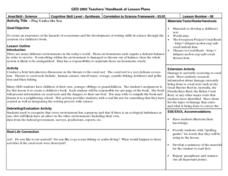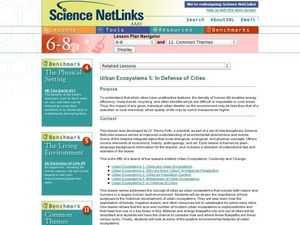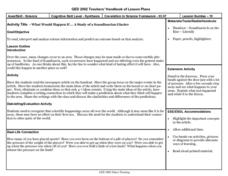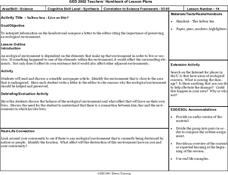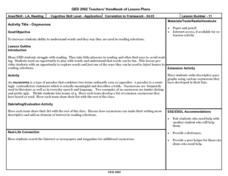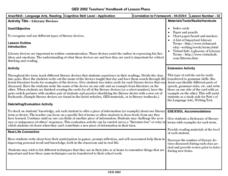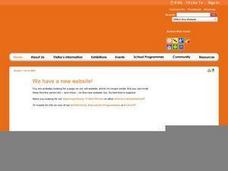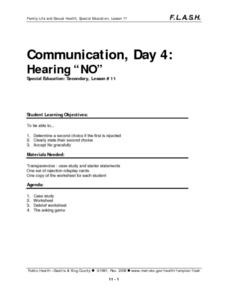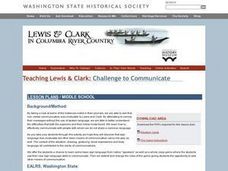Curated OER
Geography and Social Sciences
Students identify and explain how geography is connected to other academic areas and historical events.
Curated OER
Where Did It Come From?
Students research island formation, plot locations on a map and make an analysis of why some islands are formed where they are.
Curated OER
Golden Stars?
Pupils explore the possibility that all the gold on Earth came from another source. Discussions of how the materials arrived and its source forms the basis of data used to play a review game.
Curated OER
Play Under the Sea
Students explore the hazards of ecosystems and utilize their writing skills to create a studenT book. Threats to the ecosystem of the coral reef are discussed and used as a model for the research of the group.
Curated OER
Are We Taking Drugs that are Safe?
Students compare ideas and make a value judgment about medications and their reliability.
Curated OER
How Old Is Old?
Pupils explore longevity in the United States and the impact of one living longer. Statistics are used to identify life expectancy of an individual from his or her birth. Gender differences are investigated.
Curated OER
Water and Ice
Students investigate what happens to solids and liquids when they change from one form to another. The amount od space taken by frozen water begins the discussion and students are led to formulate their own hypothesis to research.
Curated OER
What Would Happen If ... A Study of a Scandinavian Glacier
Pupils read an article about changes is the landforms in Scandinavia. They identify the main ideas. They eliminate or combine to make 4-7 main ideas. Finally students write about what they predict happen share, and discuss.
Curated OER
Make a Statement!
Students discuss a class collection of bumper stickers dealing with an environmental issue. They discuss whether or not the bumper sticker have a positive effect or could change a person's viewpoiint.
Curated OER
Salton Sea - Live or Die?
Learners read and discuss the scientific article attached to the lesson. They compose a letter to the editor citing the importance of preserving an ecological environment.
Curated OER
Recycling
Students examine the impact of recycling on the economy and environment. They develop a recycling plan for their own community in order to solve recycling problems.
Curated OER
What Did You Say?
Twelfth graders identify main ideas in reading selections. They read newspaper letters to the editor, identify the main ideas, list the supporting details, and present each side of the issue to the class.
Curated OER
Why Predict?
Twelfth graders examine the process of predicting. They observe a fine art transparency, discuss their predictions about the artwork, identify the types of predictions made during a weather broadcast, and evaluate headlines from...
Curated OER
It's My Right
Students participate in activities examining the Bill of Rights. They discover the different articles and Amendments.
Curated OER
Evaluating Material By Using Quotations
Twelfth graders examine how to evaluate reading material by using direct quotations. They read a Newsweek magazine article, answer questions, underline the passage that supports their written response, and write a letter to a senator...
Curated OER
Oxymorons
Twelfth graders explore the use of oxymorons in everyday speech and writing. In small groups, 12th graders develop a list of common oxymorons they have heard or read to present to the class, and search the Internet for additional oxymorons.
Curated OER
When You Put It All Together!
Young scholars review information from variety of news sources found on the Internet, and compare and contrast the information.
Curated OER
Finding the Main Idea and Supporting Details
Twelfth graders examine how to identify the main idea and supporting details in a reading passage. They read an article, answer who, what, when, where, and how, discuss the answers, and identify the main idea and supporting details.
Curated OER
Reading Logs - Practice Creates Efficiency
Students examine how to identify the main idea and supporting details of a reading selection. They keep a reading log of what they read each day, reviewing their reading selections with the class.
Curated OER
Literary Devices
Learners identify and use various literary devices. They write the definitions of various literary devices on index cards, and with a partner review the definitions.
Curated OER
Light & Colors
Young scholars identify the types of light on the visible spectrum. They identify relationships between angles and mirrors. They state how they use light in their everyday lives.
Curated OER
The Sexual Response System
Students in upper-level sex education/family living classes study and discuss the stages of sexual response. As a group, they discuss possible real-life scenarios and the myths and misconceptions which can affect the functioning of the...
Curated OER
Communication, Day 4: Hearing "No"
Students read a case study about communicating with others. They identify a second choice if their first item is rejected. They practice accepting "no" as an answer and complete a worksheet.
Curated OER
Teaching Lewis and Clark: Challenge to Communicate
Students note instances in the journals of Lewis and Clark where they relied on non-verbal communication (sign language.) They discover some basic sign language and play a game in which they must use their new sign language skills to...





